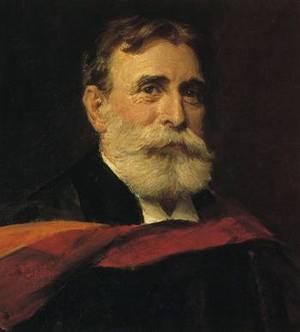 Here is part three of B. B. Warfield's "Review" of The Child as God's Child, by Rev. Charles W. Rishell, Ph.D., Professor of Historical Theology in Boston University School of Theology. New York: Eaton & Mains. Cincinnati: Jennings & Graham (1904).
Here is part three of B. B. Warfield's "Review" of The Child as God's Child, by Rev. Charles W. Rishell, Ph.D., Professor of Historical Theology in Boston University School of Theology. New York: Eaton & Mains. Cincinnati: Jennings & Graham (1904).
Warfield's review of Rishell's book was originally published in Vol. xvii of the Union Seminary Magazine, 1904. Warfield entitled his review, "Children in the Hands of the Arminians."
To read the previous posts in this series, go here: Children in the Hands of the Arminians -- Part One, and Children in the Hands of the Children -- Part Two.
We pick up where we left off last time.
__________________________________
Warfield continues to address the questions raised by Rishell's universalism -- children come into the world "saved" (not just "innocent"), and the church is to regard them as such.
As one reads on, from page to page, he is appalled by the extremity to which Dr. Rishell pushes these contentions. What he says, it is to be observed, is not that the children of believing parents are to be presumed, on the strength of the covenant promise, to be the children of God, and are to be treated accordingly. This is a Reformed doctrine; and we could only wish that Dr. Rishell and all our Arminian brethren were not only almost but altogether such as we are, in it. What he says, he says of all children that come into the world, without exception.
As Warfield points out, the Reformed notion of the covenant is grounded in God's covenant promises to be God unto us and to our children. But Rishell's notion is quite different. Since children are born "saved," they have already "been added" to the church. Thus, he argues, children ought to be baptized because they are saved and came into the world that way. This notion completely changes how the church treats its little ones.
[Rishell] formally bases a doctrine of universal baptism of children upon this postulate. Since all children are born saved, they all without exception have an indefensible right to the temporal as well as to the eternal gifts of God to His people. Nor does he say that we should treat children as presumably the objects of God's mercy, present them to God in faith, and seek the gifts of grace for them. He says that they are already - all of them - the possessors of God's saving grace; that they have, all of them, already been born anew, as truly and as effectively as any adult convert; that they, all of them without exception, begin life on this high plane, and that their only concern is to preserve the salvation they already, all of them, enjoy, and to keep the grace they, all of them, possess.
In other words, since the children are already "in," the goal of the church's nurture of its little ones is to keep these already saved children in the same condition into which they were born. On the Reformed view, membership in the covenant does not equal election, which is why children of believers who are in the covenant are to be baptized, then catechized and instructed by their parents and their church in the Christian faith. Christian parents trust God's promise that their children eventually make a personal profession of faith and then become communicant or "professing" members.
But the very possibility raised by Rishell's view that "saved" children can "fall from grace," moves a Christian parent from trusting in God's covenant promises to a morbid sense of fear that our saved children can remove themselves from their saved status from the very first moment of consciousness!
One is dismayed as he thinks of the vigor of the doctrine of "falling from grace" which is here involved. Every mother's son of the children of the heathen throughout the world; the large majority of the children born in Christendom; even a considerable portion of the children of Christian parents - forthwith "fall from grace" on the first motions of conscious life! And so serious is this fall that, as Dr. Rishell tells us, only sixty per cent of the "Christian children" who attend Sabbath school, for example, ever find their way even into the Church as an external organization, to say nothing now of finding their way to Christ!
So serious is this problem, Dr. Rishell believes, that all the non-Christians unsave themselves immediately, while 40% of saved Christian children cease to be saved the very first moment they can unsave themselves, and then never find their way back to the church! But is this not where consistent Arminianism takes us--a universal atonement which supposedly saves all until they "subtract themselves" (to follow Rishell's logic)? All non-Christian people do this, Rishell believes. Fully 40% of Christian children manage to "unsave" themselves from the first moment of consciousness! Hard to believe, but the common evangelical notion of an age of accountability wherein the children are born "innocent" (rather than already but precariously "saved") is a tenuous improvement of a very untenable understanding of God's grace.
In this state of the facts, surely, whatever may be its theoretical value in evangelicalizing the Arminian system, the practical value of the postulate that all children are born in a state of grace is as nothing; and we cannot wonder that our Arminian brethren have neglected it and have diligently sought to save their children. Born saved or not, they are no longer saved when they come under our observation; and every Christian heart will be zealous to secure or recover, as we choose to call it, salvation for them.
The logic of this leads to the following quandary, which Warfield is only too happy to point out.
In recommending parents and the Church to reverse their methods, to cease to seek the salvation of their little ones, and to treat them consistently as all already by virtue of their very nature saved, or at least safe, we fear that Dr. Rishell has "pressed beyond the mark"; and if his teaching were universally adopted, we very greatly fear we should soon find that the quotation would need to be filled out to its bitter end. We shall not benefit the children by teaching them - or by teaching those who have their spiritual good in charge - that their part in salvation is so of nature that the "faithful saying" that "Christ Jesus came into the world to save sinners" has but a modified application to them.
If Jesus came into the world to save sinners, why are children who are born saved, in need of Christ's salvation? Rather, Rishell contends, we seek to keep them from severing themselves from Christ and his covenant promises by making some dreadful choice (which is in their power) with eternal consequences. Warfield commends Rishell where he can, but chides him for his inconsistency.
There is much in Dr. Rishell's book about the duty of Christian parents and of the Christian Church to their children which it is well to say, and which is well said. Perhaps the whole of it might be read with profit by an Arminian parent who is imbued with the terrible notion - Dr. Rishell is our authority for fearing it may exist among our Arminian brethren - that children must be left untrammeled to exercise their own free choice as to salvation when the choosing time comes. As against such a dreadful idea he rightly pleads the duty and profit of Christian nurture, and seeks to put on the hearts of his readers the Biblical precept, Train up a child in the way he should go. . . . But the whole of Dr. Rishell's counsel is so vitiated by his fundamentally false postulate that its universal adoption would be as noxious as, perhaps more noxious than, the abuse which he seeks to correct.
The result is that on this scheme children come into the world "safe" at worst, and "saved" at best. If the children do not need to be saved, then they do not need to hear the promises of the gospel, and then place their personal trust in the Savior into whose covenant they are members by virtue of God's covenant promise ratified by their parents in baptism?
We have spoken of the postulate as finding its best expression in popular speech in the assumption that all children are born saved. But we have also spoken of it as, perhaps; more accurately expressed by declaring that they are all born safe. The difference of expression marks the difference between the Evangelical Arminian and the Pelagianizing, or, to use a more modern term, the Rationalizing Arminian. The difference is a purely theoretical one; it has no practical significance. In either case every child is presumed to come into the world in no need of saving. In either case the problem with the whole human race is not to save it, but to keep it from getting lost. So to state the problem is, to a believer in the Scriptural revelation, already to dismiss it.
For Warfield, Rishell's operating assumptions are biblically flawed--hence the terrible inconsistency. The entire world is born saved until that salvation is lost. This virtually echoes the Muslim claim that humans are universally Muslim, until they renounce Islam.
Surely the Bible does not think of the world as a saved world, which needs only to be kept saved; but as a lost world, which needs saving. To say that this lost estate in which the world is found is for every generation purely post-natal may be an easy rejoinder for those who are determined to support a theory and are careless of the props used. But it can convince nobody. Everybody knows in his heart of hearts that the world is by nature a lost world, and that he himself has been born a child of wrath, even as the others. To tell him that this is not true is to him the prime absurdity; and it will matter little whether he is told he is born saved or safe. The difference between the two answers is, in fact, a difference of tone rather than of principle. The one reveals a deeper sense of dependence on Christ for all the goods of this life and the next: the other reveals a stronger feeling of self-dependence. Arminianism and Rationalism - how close they lie together! The human soul is too much of a unit, and its "faculties" too little separable entities, for a strong feeling of autonomy in the one sphere of its operations to fail to work its way through all.
Warfield ties rationalism (that is, religion is grounded in human reason, not revelation) and Ariminianism together which, in this case, seems to operate without proper appeal to any biblical categories, such as the nature of human sin and the person and work of Christ in saving sinners born into a lost and fallen world, and who have no hope of salvation until called, regenerated by the Holy Spirit, and given faith through the preached gospel. Warfield notes elsewhere (in his "Review" of Methodist Theologian John Miley's Systematic Theology," that human freedom is the foundation of all Arminian theology. Warfield applies that same argument here.
Say that Arminianism is formally Thelematism [from the Greek for "will" - thelema] rather than Rationalism. It is certain that Thelematism will never escape the dangers of Emotionalism or of Rationalism, according as the temperament (or the temperature) of the individual opens this or the other channel for its extension. Professor Rishell's temperament appears to be that which is more inclined to the rationalistic side, and there is accordingly a very unpleasant tone of rationalism running through the whole volume. He makes visible efforts to keep true to current Methodist conceptions. The efforts are indeed too visible; too obviously needed. And the leaven of Rationalism is working throughout the whole discussion.
The biblical starting point is God's creation of all things as good, but now fallen and under the universal sway of sin, including its curse "death." Fallen sinners need to be saved by Christ--they are not born that way! The Arminian starting point is grounded in human reason, and upon the assumption that humans are born saved unless and until they "unsave" themselves. This is, as Warfield notes, nothing but "will" worship, arising from a distorted view of natural revelation.
More to follow.
 Thursday, April 5, 2018 at 11:13AM
Thursday, April 5, 2018 at 11:13AM 










